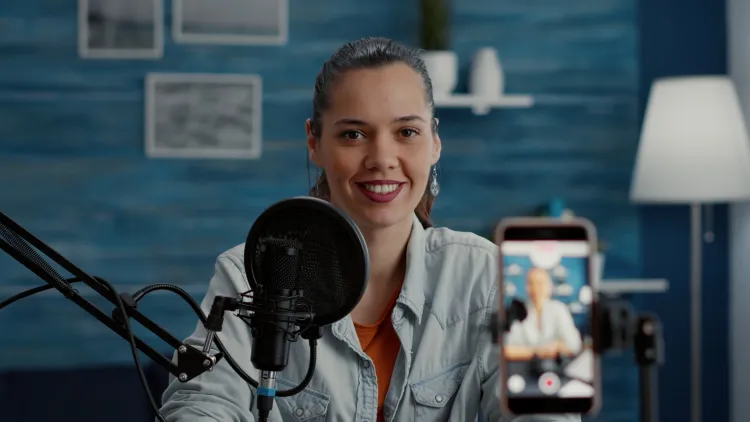If you've ever found yourself deeply absorbed in a popular podcast, hanging onto every word, chuckling to yourself, or nodding your head in agreement, you've tasted the magic of a well-targeted podcast. The secret ingredient that sets every successful podcast apart is a profound understanding of its podcast audience.
Understanding your podcast audience is not merely a tip for success; it's a prerequisite. By knowing who your listeners are, what they care about, and what they're looking for, you can tailor your content to meet their needs, desires, and interests. This encourages podcast consumption, loyalty, engagement, and growth.
But how do you go about familiarizing yourself with your audience? How do you fine-tune your content to align with their tastes and keep them eagerly anticipating your next episode? That's exactly what this guide is here to help you with. We'll walk you through each step of defining your podcast audience, providing actionable advice to help you turn casual listeners into committed fans.

Book Your Next Podcast Guest the Easy Way
With more than 70,000 members, MatchMaker.fm is the largest online community connecting podcasters & guests.
Join MatchMaker todayHow Important Is Understanding Your Podcast Audience?
To put it bluntly, extremely. Your audience is the lifeblood of your podcast. Real people who choose to spend their valuable time tuned into your show. Your audience gives your podcast its purpose and drives its direction. The profound influence they wield is felt in every facet of your podcasting journey - the why, the how, and the what of your podcast hinges on them.
Their tastes, interests, and preferences shape your podcast's voice, tone, and structure. They influence your episode lengths and even the types of guests you invite to your show. Looking at their lifestyle can guide you in choosing the right social media platforms for promotion or even influence whether you opt for a video podcast or stick to audio.
But their influence goes beyond the immediate realm of podcasting. When it's time to monetize your show and pitch to sponsors, your understanding of your listeners' demographics and psychographics will sweeten the deal. Potential sponsors want to know who they'll be reaching, and your detailed listener persona can provide all the answers.
Essentially, your listeners are not just passive recipients of your content. They’re active influencers in your podcast's evolution. Their centrality in your podcasting journey cannot be overstated, and understanding them is the key to unlocking your podcast's full potential.
So, in essence, understanding your podcast audience isn't just important - it's the linchpin of your podcast's success.
How to Identify Your Ideal Podcast Listener
In your podcasting journey, one of the most critical steps you'll take is identifying who your ideal listener is. An ideal listener, also known as a podcast avatar, is a detailed profile of your target audience member. This profile outlines the person most likely to tune into your show, engage with your content, and become a loyal fan. It's essentially a character sketch of who you're talking to every time you hit record.
However, it is important to note that this isn't about picking a face in the crowd. It's about understanding the crowd, who they are, what they care about, and what they need. In other words, you're crafting a listener persona to guide your podcast creation.
1. Understand Your Podcast Listener Demographics
Podcast listener demographics refer to statistics related to a specific population's characteristics. These include elements like age, gender, location, and occupation. Understanding your audience demographics gives you a ballpark idea of who you're creating content for in podcasting.
As a podcaster, tapping into demographics can help shape your podcast's content, tone, and style. For instance, if your podcast caters to millennials, you might infuse contemporary lingo and discuss topics related to this age group. On the other hand, a podcast targeting retirees may be designed with a different tone and content selection.
Demographic data is a broad brush. While having this overview is essential, it's not about boxing your audience into rigid categories. Consider it as an initial sketch, a rough draft. The key lies in layering these demographics with more in-depth psychographic data, which is where the listener persona starts to take shape. This way, you're not just speaking to an age group or a profession; you're speaking to real people with varied interests and lifestyles.
2. Nail Your Audience’s Psychographics
Psychographics delve into the attitudes, behaviors, and interests of your audience. This includes their hobbies, lifestyle choices, values, opinions, and more. Unlike demographics, psychographics aren't easily categorized into statistical data; they provide more nuanced insights into what makes your audience tick.
Understanding your listeners' psychographics is crucial because it directly informs your content and the manner in which it's presented. For instance, if your audience is made up of busy entrepreneurs looking for quick small business tips, you may opt for short, bite-sized episodes filled with actionable advice.
Simply put, psychographics enable you to create a podcast that fits seamlessly into your audience's lifestyle. It helps you make strategic decisions about everything from episode length and content to the choice of guests and social media channels.
With this knowledge, you're not just broadcasting to your audience but engaging with them. You're creating a podcast that reflects their world and speaks to them on a personal level.
3. Identify Your Audience's Pain Point (& Your USP)
Pain points, in the context of podcasting, refer to the specific problems or challenges your ideal podcast listeners face that your podcast aims to address. Identifying these pain points allows you to tailor your content to answer these needs or solve these problems directly. This way, your podcast serves as a source of entertainment and a valuable resource for your audience.
Let's say you're targeting young adults in Ontario who are struggling with personal finance, for example. Their pain point might be the intimidating jargon-filled financial advice out there. Your podcast could provide Canadians with simple, clear-cut financial guidance, thereby solving this issue.
This solution is where your Unique Selling Proposition (USP) comes into play. The USP sets your podcast apart from others in the same niche. It's that element that makes your podcast uniquely beneficial to your audience. To nail your USP, you should also conduct a thorough competitive analysis to ensure your podcast idea is actually unique.
Understanding your audience's pain points and creating a USP to address these issues ensures your podcast is offering tangible value. It also helps to differentiate your show from the masses and convinces your audience to come back for more, converting them from occasional visitors into loyal fans.
What’s the Best Way to Research Your Podcast Audience?
But the question remains, how do you know who your podcast audience is?
If you're just starting out with your show, it might be hard to pinpoint who your ideal listener is. Guesswork might get you part of the way there, but if you want a clear image of your audience, consider competitor research. Investigating other podcasts in your niche can provide valuable insight into what they're offering and, more importantly, what they're missing. Are there topics they haven't explored? Is there a perspective they've overlooked? These gaps represent opportunities for your podcast to bring something fresh and unique.
Once your podcast is up and running, there are numerous ways to refine your understanding of your audience. Surveys and social media can offer powerful insights into the minds of your podcast consumers, revealing what they love about your show and what they think could be improved. Look for podcast trends and patterns in the comments and discussions around your podcast. It's easy to overlook that there's a person with unique preferences and feedback behind the podcast statistics and every audio or video play.
How to Evaluate & Adapt to Your Podcast Audience
With all this information at your fingertips, you can refine and adapt your understanding of your audience. You may even discover new demographics or psychographics you hadn't initially considered. Staying ahead of the game requires ongoing audience evaluation and a willingness to adapt. It's essential to stay curious and responsive to any changes you notice.
Once you identify these changes, don't shy away from adjusting your podcast strategy accordingly. Maybe a particular topic garners more interest than you anticipated, or a new trend surfaces that your audience seems to resonate with. Being flexible and adaptable is key. Your podcast is for your audience. If they are leaning towards a particular type of content or format, it's worth considering.
Remember that adapting to your audience doesn’t mean losing your unique voice or mission. It's about growing alongside your listeners, tailoring your podcast to their changing needs and preferences while staying true to your core message and purpose. By continually evaluating and adapting to your audience, you ensure that your podcast remains relevant, engaging, and enjoyable for your listeners.
Final Thoughts: Defining Your Podcast Audience
As mentioned above, your listeners are the lifeblood of your podcast. So, who are they? Creating an ideal listener avatar or a podcast persona involves more than just understanding demographics. Yes, knowing their age, gender, and location is important. However, it's the deeper understanding of psychographics - their interests, attitudes, behaviors, and pain points - that truly lets you connect on a meaningful level.
As you carve out your unique niche in the podcasting landscape, always ask: "Why are they listening to your podcast and not another?" This goes beyond entertainment. Are you offering inspiration, education, or a sense of community? Identifying this unique selling proposition sets you apart and turns occasional listeners into dedicated fans.
Finally, remember that understanding your audience isn't a one-time task. As your podcast evolves, so will your audience. Stay tuned into their feedback and changing preferences. Keep adapting, refining, and innovating.
Your audience doesn't just define your podcast; they are the key to its future. Stay curious, stay connected, and you’ll be on your way to creating a podcast that resonates, engages, and grows with its listeners.

The #1 Podcasting Community
With more than 70,000 members, MatchMaker.fm is the largest online community connecting podcasters & guests.
Join MatchMaker today





